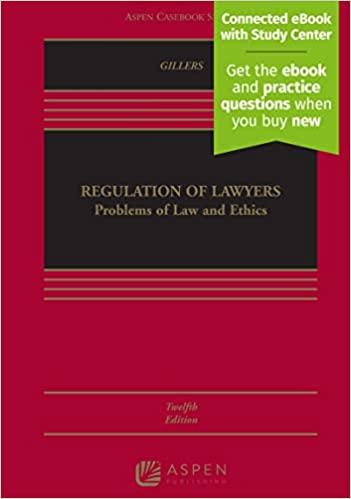Question
Analyze the facts in the scenarios and develop appropriate arguments/resolutions and recommendations. Support your responses with appropriate cases, laws and other relevant examples by using
Analyze the facts in the scenarios and develop appropriate arguments/resolutions and recommendations. Support your responses with appropriate cases, laws and other relevant examples by using at least one scholarly source.
Scenario I: Courts and Alternative Dispute Resolution
Alana Mendes suffered from Alzheimer's, and was admitted to the Bay Pines Rehabilitation Center. Because of her mental condition, Alana's daughter, Juanita, completed the admissions paperwork and signed the admissions agreement. The admissions documents included a clause that required parties to submit any disputes for arbitration. When Alana was released from the center four months later, she sued for negligent treatment and malpractice during her stay. Bay Pines moved to require arbitration.
1. This is a claim of negligent care, not a breach of a commercial contract. Is it ethical for medical facilities to impose mandatory arbitration? Is there really any bargaining over such terms?
2. Should a person with limited mental capacity be held to the arbitration clause agreed to by the next-of-kin who signed on behalf of that person?
Scenario II: Due Process and ADR
In 2016, a report found extremely high rates of obvious plagiarism in the theses of graduate students in the MBA program in the College of Business at Western State University. Two full-time faculty members and three adjuncts were identified for ignoring their ethical responsibilities and contributing to negligence toward issues of academic misconduct. Assistant Professor Mark Day was one of the five professors identified in the report. The findings were published during a press conference in May 2016. The dean of the College of Business, Derrick Dawson, removed Day's responsibilities for advising graduate students and scheduled him for undergraduate courses for the next semester. Day filed suit in a federal district court against Dawson, the university, and others for violating his due process rights by publicizing accusations about his role in plagiarism without providing him with a meaningful opportunity to clear his name in public.
- What does due process require in these circumstances?
- Would the outcome be different if a mandatory arbitration clause was provided in Day's contract and the university filed to dismiss the suit to require arbitration?
Step by Step Solution
There are 3 Steps involved in it
Step: 1

Get Instant Access to Expert-Tailored Solutions
See step-by-step solutions with expert insights and AI powered tools for academic success
Step: 2

Step: 3

Ace Your Homework with AI
Get the answers you need in no time with our AI-driven, step-by-step assistance
Get Started


